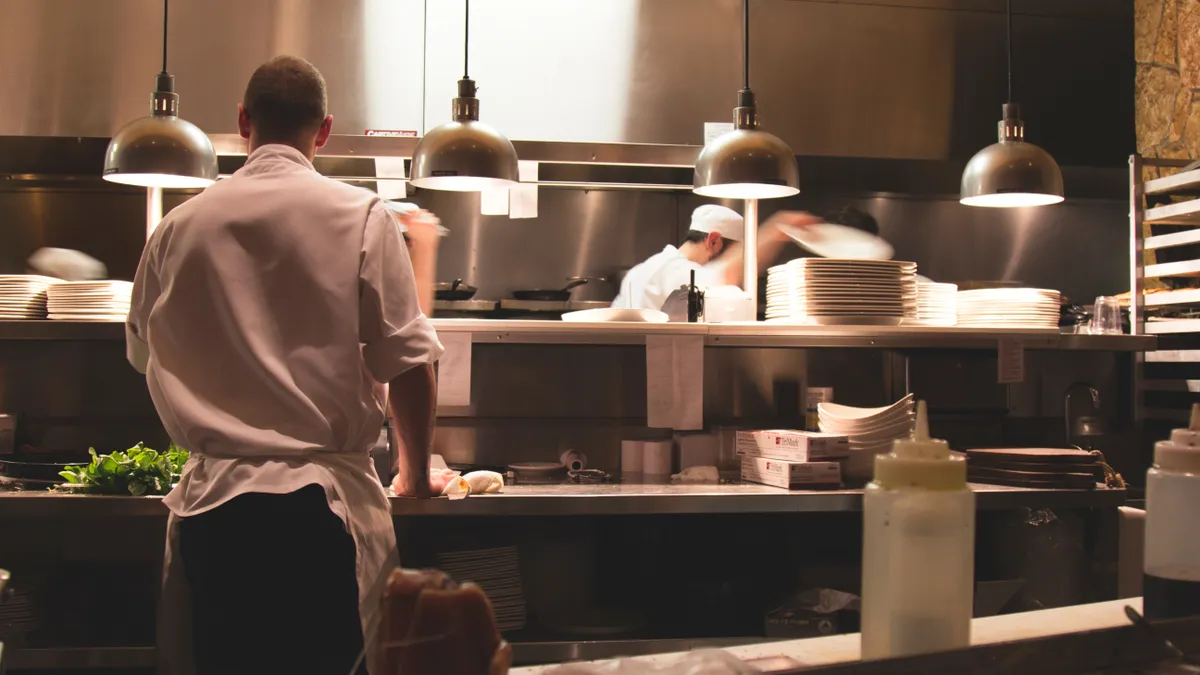Dive Brief:
- California-based startup Kitchen United has raised $10 million in funding from Alphabet’s venture capital arm Google Ventures, with participation from co-founders Harry Tsao and CaliBurger CEO John Miller, according to a company release. Kitchen United offers what it calls “kitchen centers” — warehouse-type facilities that include commercial kitchen spaces, food prep stations, refrigeration and storage — for entrepreneurs looking to expand into new markets before investing fully in real estate and other costs, according to the company's website.
- Kitchen United also provides parking for third-party delivery partners, software solutions, marketing and promotional assistance, back-of-house services and operational infrastructure. Kitchen customers can also leverage aggregated consumer and operational data to provide insights into their business.
- The initial Kitchen United, which opened in May in Pasadena, includes a 12,000-square-foot space that houses 15 restaurant chains — including regional brands Northern California better burger and vegan startup The Pizza Plant.
Dive Insight:
Kitchen United plans to use this investment to expand into new markets with strong restaurant scenes — including Los Angeles, Atlanta, Columbus, Phoenix, Seattle, Denver and New York — by the end of next year. This latest round of funding illustrates a growing trend in “ghost kitchens,” which started popping up more frequently last year in response to the growing demand for off-premises dining. European delivery service Deliveroo launched a platform for restaurant partners to open delivery-only kitchens last year, for example, while New York-based Pilotworks raised $13 million last year to expand open similar kitchen spaces, among other initiatives. Even major chains like Chick-fil-A are exploring warehouse-like prototypes to keep up with off-premises demands.
Sales through third-party delivery services totaled $5 billion for the first two quarters of 2018, a 55% leap over their collective intake for the same period last year, according to Technomic. Simultaneously, carryout and catering have also grown, adding a significant amount of pressure on restaurant staff to keep up with demand from added channels and potentially causing bottleneck lines in-store or at the drive-thru. These hubs can ease some of those pressures by just focusing on delivery and carryout business.
For newer concepts, these facilities can provide a space to test menu items, operations and markets without an upfront commitment to high real estate and equipment costs. Restaurant operators already have to juggle rising labor and food costs, so these spaces can provide some relief — a big value add in an industry that experiences high failure rates.
The data component from Kitchen United is also a critical piece of its platform. It can help concepts avoid failure by providing deep insights into which menu items are resonating best in the market before a full rollout and operational/SKU investments. As consumer demands continue to evolve at a swift pace, having access to insight like this can make or break a concept.
Ghost kitchens read well on paper, and Kitchen United’s founders have relevant experience, but this strategy isn't without challenges. Some early players in this new space, such as Sprig and Maple, have already folded, as delivery-only structures have proven to be costly and menus tend to be limited.
Kitchen United is purposefully trying to avoid these roadblocks with a focus on scaling and food innovation. In addition to expansion, the company also plans to use its funding to bolster its marketing, engineering and operations structures. As more consumers forgo the dining room — and even the drive-thru — in favor of their own living rooms, these types of facilities may prove that the future of the restaurant industry may actually be shared kitchen hubs that allow concepts to be nimble, meet convenience demands and save on costs.












